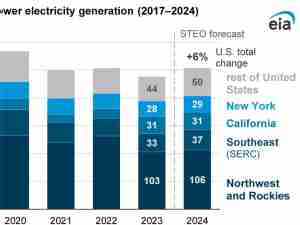Zuma’s Grip Loosened by Upheaval at South African Power Utility
By: | Jun 13 2017 at 11:18 AM
Management upheaval at South Africa’s Eskom Holdings SOC Ltd. has dealt another blow to President Jacob Zuma as he battles allegations that he’s been pivotal to a scheme to siphon off billions of rand from the power utility and other state companies.
Ben Ngubane quit as Eskom’s chairman late Monday just two weeks after the ruling African National Congress forced its board to rescind a decision to reappoint Brian Molefe as its chief executive officer. A graft ombudsman’s report and a trove of as many as 200,000 emails leaked to local media indicate that the two officials may have abused their positions to the benefit of members of the Gupta family, who are friends with the president and are in business with his son.
Whereas Zuma, 75, was once seen as someone who couldn’t be challenged, the evidence swirling around him and his allies has become “too damning for anyone to ignore,” Somadoda Fikeni, a politics professor at the University of South Africa in the capital, Pretoria, said by phone. “The president is losing ground day by day.”
Zuma, who’s due to step down as ANC leader in December and as president in 2019, has seen off a succession of scandals since taking power in 2009, including a finding by the graft ombudsman that he violated his oath of office by refusing to repay taxpayers’ money spent on his private home. He’s filed a lawsuit challenging separate findings by the ombudsman indicating that he allowed the Guptas to influence cabinet appointments and the award of state contracts. He’s also dismissed media reports based on the leaked emails that have been published daily since May 28 as rumor and speculation.
Party Opposition
Zuma has repeatedly shrugged off efforts to censure him. Last month, the party’s decision-making national executive committee for a second time debated, and rejected, a proposal to remove Zuma as president, and ordered its lawmakers in parliament to vote against an opposition motion of no confidence in his leadership. The party backed a call for a judicial inquiry into “state capture”—a term used to describe undue influence on government officials by private business interests.
The emails leaked to the amaBhungane Centre for Investigative Journalism and Scorpio, the Daily Maverick news website’s investigative unit, as well as reports by the country’s main church organization and a team of eight academics place Zuma and the Guptas at the center of an orchestrated effort to raid state assets. Besides Eskom, port and rail operator Transnet SOC Ltd., weapons company Denel SOC Ltd. and the Passenger Rail Agency of South Africa were among the entities that were allegedly targeted.
An investigation requested by the government found that Ngubane and Molefe helped facilitate financing for a company controlled by the Guptas and Zuma’s son to buy a mine from Glencore Plc and ensured that it secured lucrative coal contracts.
Grip Weakened
Ngubane, the Guptas and Molefe, who’s fighting his dismissal as CEO in court, have all denied wrongdoing.
While Zuma’s continued control over the dominant faction within the ANC should enable him to cling to power until he steps down as party president, his associates’ grip over the state companies has been weakened, according to Darias Jonker, an analyst at Eurasia Group.
“The patronage network has been delivered a significant blow at Eskom,” Jonker said by phone. “Their very extensive network will continue functioning across other state-owned enterprises, although time is running out.”
Ngubane cited personal reasons for stepping down, Khulani Qoma, Eskom’s board spokesman, said on Tuesday. Zethembe Khoza, a director of the utility, was named as interim chairman until the cabinet approves a replacement.
Held Accountable
A group of ANC lawmakers who help oversee Eskom viewed Ngubane’s resignation “as an attempt to avoid being held accountable for his role in recent events at Eskom” and called for another probe into allegations of misconduct and corruption at the utility, they said in an emailed statement.
Anne Fruhauf, vice president at New York-based risk adviser Teneo Intelligence, sees the decision by Zuma and his allies to abandon their control of Eskom as a strategic retreat, because they risked becoming embroiled in legal battles they had no hope of winning.
“The Zuma faction is letting go of issues that may drag them down,” Fruhauf said in an emailed response to questions. “Zuma will lose a few battles along the way, but it will be a long and protracted fight until he loses the war.”








